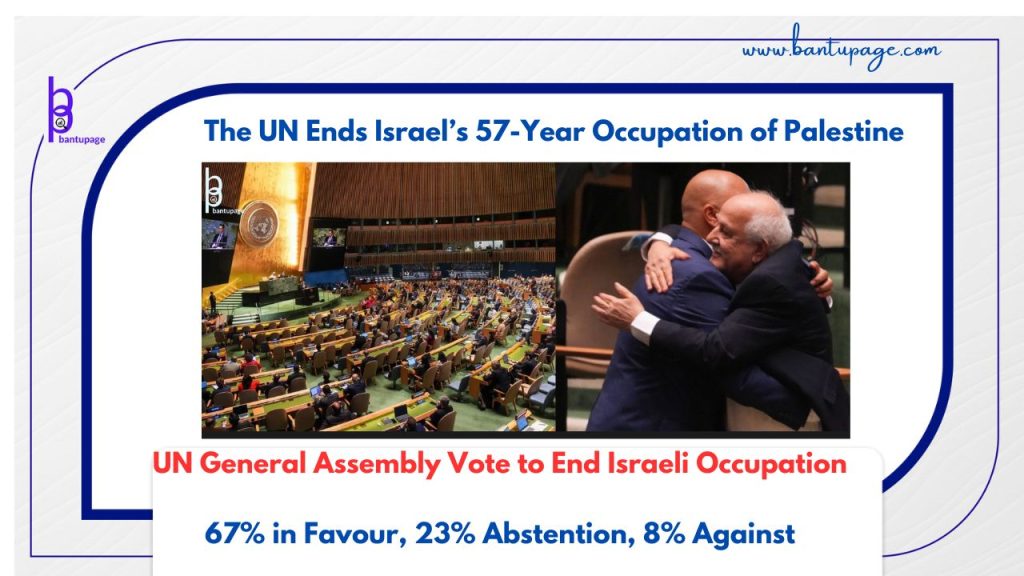
Finally, the UN General Assembly Voted to End Israeli Occupation Over Palestine
Palestine is a country without independence. It was previously under Jordanian control until the Arab-Israeli war in 1967, when Israel captured the territory. Fair enough! There was a war, and one party captured some lands. The date was 7 June 1967, when Palestine came under Israeli occupation. Palestine will never become Israel; this is not open for debate. There can be no harm in an independent Palestine living in peace adjacent to an independent Israel. If granted statehood and Palestine threatens Israel, the world would unequivocally support Israel’s right to self-defence. Until then, the prison warden cannot claim to defend himself against a prisoner who is yelling and banging at the gate of the prison cell by shooting at the prisoner through the gate. It makes no sense.
Let’s not digress. Palestine is a country; Palestinians are people. The collective failures of the Arab states have reinforced Israeli barbarism. It kills, butchers, bombs, and tortures Palestinians as it wishes. The world’s great powers and richest countries support it. In fact, Israel receives more US attention and support than America’s many counties. It is the US’s quasi-51st state.
Fast forward to 2024: what does Israel gain by blocking 5 million Palestinians, who are more than half of the Israeli population, from having their own state? They clearly don’t get along and cannot live in one country; therefore, isn’t it common sense to let them be? What could make any country abstain from voting for an independent Palestinian state, let alone vote against it? Are these countries pleased with what is going on in Gaza and the West Bank?
The UN General Assembly held a voting session on ending the Israeli occupation of Palestinian territory. Fourteen countries voted against it. Their decision falters in front of common sense. What could possibly be the reason for not voting to end 57 years of occupation that has seen the world polarised? The US’s blatant support for Israel crosses all red lines. Only one country launches cruise missiles, banned weaponry like cluster bombs, and white phosphorus munitions on unarmed civilians who have no access outside their borders. It has launched thousands of such bombs over the last ten months alone. On average, not even Russia has launched this much at Ukraine in over two years.
 Vote breakdown at the UNGA on Israel to End its Occupation in Palestine
Vote breakdown at the UNGA on Israel to End its Occupation in Palestine
Argentina, the Czech Republic (Czechia), Fiji, Hungary, Israel, Malawi, Micronesia, Nauru, Palau, Papa New Guinea, Paraguay, Tonga, Tuvalu, and the United States voted against the motion. Israel’s vote for itself makes sense; the US’s involvement in the genocide in Gaza and its decades-long bombardment of Palestine make it a party to the genocide, so its vote is also understandable. But Malawi, Papua New Guinea, Paraguay, and Argentina—what could be their motivation? Countries like Tuvalu, Tonga, Nauru, and Micronesia, which most people have never heard of and have fewer people than Alaba International Market in Lagos, are irrelevant. However, in Hungary’s case, what is it for Viktor Orbán, the Hungarian Prime Minister, who has been a vocal critic of the left and Wokism?
The bulk of the abstained countries are located in Europe. Albania, Austria, Bulgaria, Croatia, Denmark, Georgia, Germany, Italy, Lichtenstein, Lithuania, the Netherlands, North Macedonia, Poland, Moldova, Serbia, Slovakia, Sweden, Switzerland, Ukraine, and the United Kingdom are all Caucasian-dominated countries. Most Israelis are Europeans who immigrated to Israel, which explains why they don’t look Middle Eastern. By definition, Israelis are Caucasian, which explains the support they receive from Europe—from one White person to another. However, these seven African countries also abstained. These countries include Cameroon, DR Congo, Ethiopia, Kenya, Liberia, Rwanda, and South Sudan. Why would they do that, and what is it to them?
There was more abstention in Asia, the Caribbean, Oceania, and North and South America. India, Nepal, and South Korea abstained in Asia. Costa Rica, the Dominican Republic, Ecuador, Guatemala, Haiti, and Panama abstained in the Caribbean and South America; Canada abstained in North America; and Australia, Kiribati, Samoa, and Vanuatu abstained in Oceania. Why did they abstain? Are they content with the occupation? It is equally important to note that some European Union powerhouse countries voted for the motion. France, Spain, Norway, Finland, Greece, Portugal, and Ireland voted in favour. Two members of the G7, France and Japan, voted in favour.
Of the 38 sub-Saharan African countries participating, 31 voted in favour, six abstained, and one voted against. Meanwhile, 45 European countries participated, with twenty-three voting in favour, twenty abstentions, and two against. East Asia and Oceania had 25 countries: fourteen in favour, five abstentions, and a staggering six voted against. For the Middle East and North Africa, 17 countries participated, including Iran and Turkey, and all seventeen voted in favour. The Caribbean and South America included 30 countries; twenty-two voted in favour, six abstentions, and two voted against. For South, Central, and East Asia, 24 countries took part. Twenty-one voted in favour, two abstentions, and one voted against it. Finally, North America had two countries, one abstention for Canada and one the US voted against.
In total, 181 countries participated in the vote; 124 voted in favour, 43 abstentions, and 14 against, representing 67% in favour, 24% abstentions, and 85 against. What could have made any country abstain from voting in favour of ending the 57-year occupation or even voting against it would forever remain a mystery. The Palestinians have the right to determine their future. They have proven time and time again that they want their future in their own hands. They don’t want to become Israelis or live under zionist ideology. Israel, the United States, Europe, Argentina, South Korea, Australia, and Canada must come to terms with this.
By Ikechukwu ORJI





